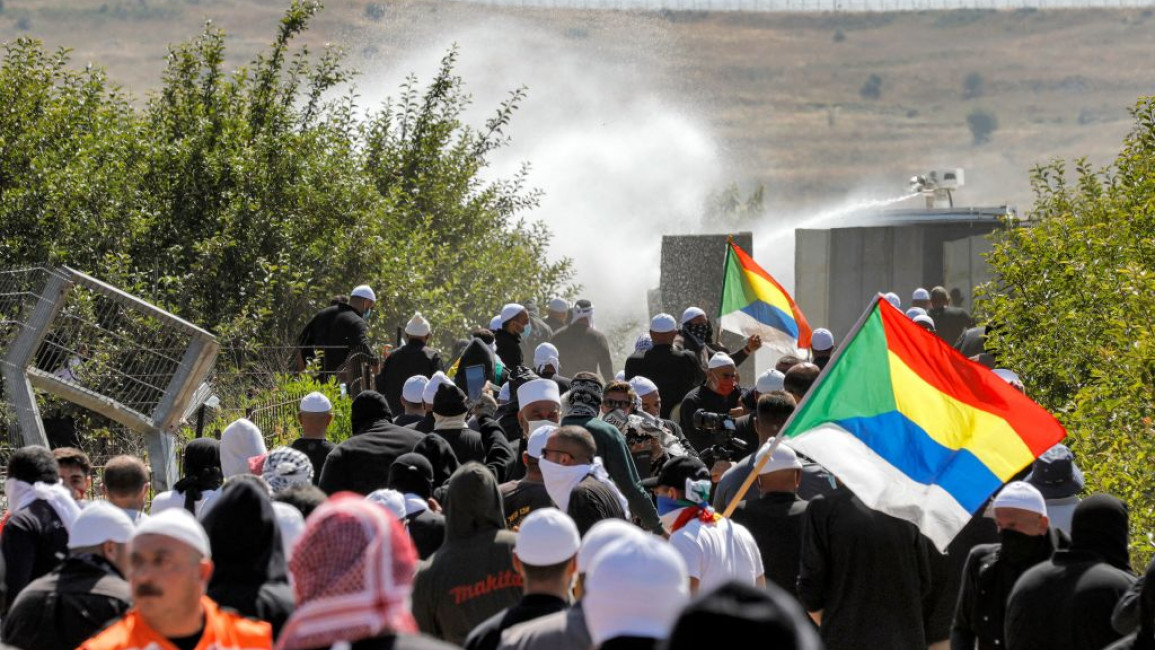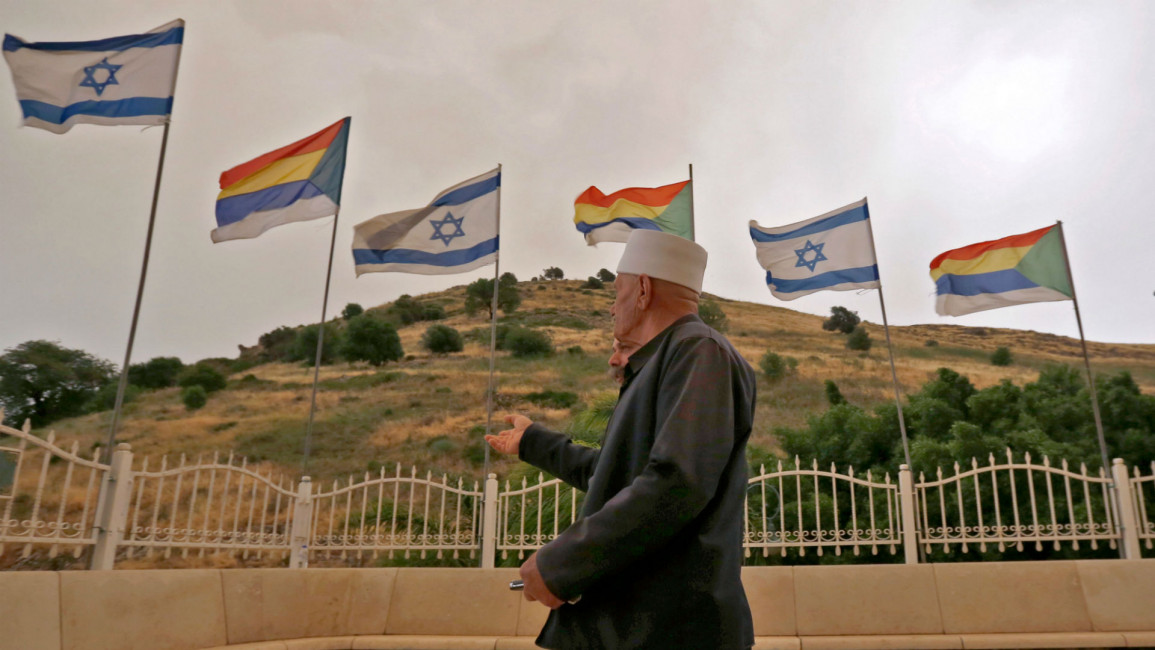
The Druze community in Israel: Questions of identity, rights, and loyalty

In the occupied Golan Heights last week, hundreds of Druze protesters demonstrated against Israeli plans to build wind turbines on their land, saying it would harm agriculture in the region.
Opposition to the state-backed renewable energy project has seen thousands of Druze in the Golan, most of whom are Syrian citizens, mobilise against the Israeli state in recent weeks.
On Saturday, the spiritual leader of the Druze in Israel, Sheikh Muwafak Tarif, spoke at an emergency meeting in Kafr Yasif near Acre in northern Israel, warning Israeli Prime Minister Benjamin Netanyahu that if he didn’t respond to the community’s demands "there will be a response that Israel has not seen to this day”.
The Druze leader also called for a halt to demolition orders issued for Druze homes in Israel and the cancellation of fines for construction without a permit.
Tensions between Israel’s Druze and the state have been festering for years, becoming more visible with Israel’s introduction of the 2017 Kaminitz legislation and the 2018 controversial Nation-State law.
The Kaminitz legislation expanded the use of the Israeli state’s administrative powers to carry out demolition and eviction orders, which thus far had focused solely on Israel’s Palestinian citizens.
"Tensions between Israel's Druze and the state have been festering for years, becoming more visible with Israel's introduction of the 2017 Kaminitz legislation and the 2018 controversial Nation-State law"
The Nation-State law, meanwhile, downgraded Arabic - spoken by 20% of the population - to a secondary language and limited the right to self-determination to Jews only. The law does not reference the equality of all Israeli citizens as once made in the 1948 Declaration of Independence.
The roughly 150,000 Arab Druze - a 1,000-year offshoot practice of Shia Islam - saw in Kaminitz and the Nation-State laws a violation of their citizenship rights, especially as most have deemed themselves loyal, integrated Israeli subjects with undeniable contributions to the Jewish state.
The impact of discriminatory laws was noticeable in the last two Israeli general elections, with more Druze voting for the Arab Joint List, and, according to Israeli Channel 12, more engaging in debates about the value of enlisting in the Israeli army.
Hierarchal rights
On the surface, the Druze issue appears like an internal civil rights debate. But in the self-declared Jewish state, non-Jews’ rights have been contingent on proving ‘loyalty’ to the state, even if certain laws are geared against them.
Druze ‘loyalty’ and, therefore, access to civil rights, has been closely tied to their service in the Israeli army. Some Druze, in fact, occupied high-ranking positions in the army and many of them served in the 1967-occupied territories. That earned the community a negative reputation amongst most Palestinians.
Others, however, see the Druze situation more critically as a product of a tragic identity crisis imposed by a complex settler-colonial context.
As early as the 1930s, the Zionist movement realised that given the fierce Druze resistance against the French in Syria (1925), it was necessary to neutralise their threat or align them with the Zionist cause. One way to do it was to exploit their minority vulnerabilities and the factionalism among the three Druze families - Tarif, Yarka, and Abu Snaan.
After Israel’s 1948 inception, the Israeli state sought to divide the remnants of Palestinians by marginalising groups - like Bedouins - and cultivating relations with others, mainly the vulnerable Druze.
|
|
The Druze were redefined as an ethnoreligious group and recategorised as not Arabs or Muslims, thereby closer historically to Jews than to Arabism or Islam and possessing historical and cultural exceptionalism parallel to the Jewish one.
The label was meant to remove the Druze from their natural Palestinian-Arab context and Israelise the community and use them as part of the Zionist divide-and-rule strategy. Protection and citizenship rights were ‘offered’ in return.
Zionist and Druze apologists nowadays attribute the ‘Israelisation of the Druze’ to the community’s neutral position in pre-Israel Palestine, rather than a deliberate Israeli policy, as if to suggest that the Druze originally lacked any affiliation with their Palestinian-Arab collective and its national consciousness.
Druze neutrality, if existed, was at best circumstantial. By 1948, most of the Druze - then not surpassing 10,000 - were an agricultural, predominantly illiterate community living in villages in the mountains away from Metropolitan Palestine. Most had limited access to the politicised urban elite and were somewhat isolated from the pan-Palestine clashes with Zionism.
Unlike their brethren in Syria and Lebanon, who fiercely opposed Zionism, Palestine’s Druze lacked dominant feudal elites to act as political guidance.
The concept of neutrality, still, does not explain the Druze participation in the 1929 and 1936 revolutions against the British mandate and Zionism. The Druze Gang of Green Palm, for instance, was an anti-colonial organisation that carried out several attacks in 1929 on Zionist settlements in Northern Palestine. In 1930/34, bloody clashes erupted between the Druze village of Buqai’ah in Galilee and Zionist settlers who had encroached on their village lands.
"For 75 years, 'loyalty' to the state and the disproportionate enlistment in the army has not earned the Druze equal rights to Jewish-Israelis"
The army trap
In 1956, as part of the Israelisation process, Druze leaders were pressured into signing an agreement - without consulting the Druze majority - to conscript their youths into the Israeli army for three years. Protests against the law soon erupted, demanding that the minority be exempt from service, like Palestinian Muslims and Christians.
Of the Druze who refused to enlist and, as a result, faced prison was renowned Palestinian poet Samih al-Qassem.
Supporters of conscription saw the army as a way to help their impoverished community and achieve equality with Jewish-Israelis. Today, the Druze have a higher rate of conscription than their Jewish counterparts, proportionally more of them serve in combat roles and the border patrol units, and more, per capita, are likely to get killed in action.
But army service is yet to reflect positively on their economic situation. Most villages in northern Israel have suffered for years from negligence and discrimination. Most homes were built without a permit because they were never issued. Some 500 houses are not even connected to the electricity grid, according to City Hall.
Equally tragic is that army service has put the Druze on a collision course, sometimes fatally, with the Palestinian mainstream.
In the Gaza Strip during the First Intifada, the predominantly Druze unit of Mishmar Ha-gvul (Border Police) was among the most abusive towards the local population. This legacy was exceeded during the 2014 Gaza onslaught when Ghassan Eliyyaan, a Druze commander of the Israeli Golani Unit, ordered the Shujaiya massacre, which claimed the lives of 70 Palestinians.
In November last year, Israelis Tiran Fero, 17, and a friend were driving east of Jenin when they were involved in a car accident. Fero’s body was taken to a local hospital but was taken by Palestinian fighters who misidentified him as an Israeli soldier. They wanted to trade his body for Palestinian detainees in Israel. With his Druze identity revealed, Fero’s body was returned to his family.
Yet, today, more and more young Druze are refusing conscription for political reasons rather than seeking exemption for religious ones or by deliberately failing the military’s aptitude test.
A burgeoning campaign called Urfod (“Refuse” in Arabic), launched in 2013, has been at the forefront of encouraging Druze males to refuse service in the Israeli army. The campaign provides legal support and information about how to avoid being drafted into an army that occupies their fellow Palestinians.
The refusers typically lack sufficient support within the community. Urfod raises scholarship money and other types of support to help them.
|
|
Self-deception?
For 75 years, ‘loyalty’ to the state and the disproportionate enlistment in the army has not earned the Druze equal rights to Jewish-Israelis or higher than those of their fellow Muslim and Christian Palestinians in Israel. ‘Loyalty’ was rewarded with the Israeli state seizing 70% of Druze land - as it has done with the rest of the Palestinian minority - to build new communities exclusively for Jews.
This is heightened by a Jewish-Israeli mainstream, including on the left, who have selectively supported Druze rights provided these rights did not disturb the Jewish-centric hierarchy. These same Jewish-Israelis have long ignored the only political parties in the Knesset with programmes committed to equality. Instead, occasionally, they accused them of sedition and disloyalty.
The centre-left Zionist Union and Yair Lapid’s centrist Yesh Atid parties, for example, have declared their support for Druze equality but stood actionless when the Knesset’s presidium disqualified Balad, a Palestinian party, from even submitting a bill on Israel as a state for all its citizens.
Druze rights in Israel are, at best, partly fulfilled and, at worst, mere aesthetics serving Israel’s divide-and-conquer strategies. Only time will tell - given increased Druze disillusionment - if meaningful revisions of identity and loyalty will take place among the community.
Dr Emad Moussa is a researcher and writer who specialises in the politics and political psychology of Palestine/Israel.
Follow him on Twitter: @emadmoussa




